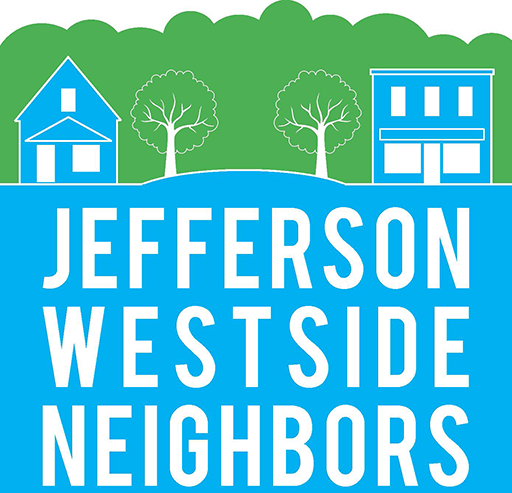On this page:
-
Homelessness:
-
City Guidelines on Camping during COVID
-
Homelessness: Supporting Transition Shelter Options (including Westmoreland Park Safe Spot)
-
Supporting the Needs of the Unhoused
-
-
Permanent Supportive Housing
-
Reviving the Idea of Supportive Housing at Old Naval Armory Site [moved to its own page]
-
Permanent Supportive Housing at Lane Events Center
-
Keystone FAQ, resident requirements, and contact information
-
Latest News
2/17/22: JWN Executive Board supports Eugene’s efforts to get more state funding for Homelessness:
Dear Representative Fahey,
We hope this email finds you well.
The Executive Board of Jefferson Westside Neighbors (JWN), a chartered neighborhood association in West Eugene, wishes to express our support for Eugene Mayor Lucy Vinis along with the cities of Bend, Medford, Salem, Beaverton, Hillsboro, Gresham, and Portland for increased state funding to proactively address the homeless crisis.
The JWN has been on the frontlines of the homeless crisis and we have actively worked with White Bird, Community Supported Shelters, the Eugene Chamber of Commerce, and other groups on comprehensive solutions that reduce community impacts by providing managed shelters and creating supportive and affordable housing. We host a Safe Spot, several clusters of Conestoga huts, a new Permeant Supportive Housing complex, and are working on more affordable housing on city owned land in our neighborhood.
Jacob Fox, Executive Director of Homes for Good stated “The leadership from the JWN’s is humbling. I have never experienced neighborhood leaders that are so supportive of affordable housing and permanent supportive housing in particular. I am extremely thankful and am looking forward to delivering critically needed affordable housing in partnership with JWN.”
The only viable, ethical solution for un-housed, housed, and businesses is to provide safe and sanitary places for people to go and reduce or eliminate unsanctioned and unsafe ad hoc camping in public space. We believe these proposals help us get closer to a solution:
Emergency Shelter and Camping (development and operation efforts).
Cities have budgeted for FY22 to expend roughly $37.6M for emergency shelter and camping options. This is a mix of local general funds, some local ARPA funds, ARPA allocations from the state in 2021, and also direct allocations from the state for shelter funding in 2021. These efforts encompass emergency shelters/navigation centers, to car camping sites, to camping sites.
Support Services
Cities have budgeted for FY22 to expend roughly $16M for support services. This is a mix of local general funds, CDBG allocation, and some ARPA local funds. Services include support for day shelters, human services investments, health care for unhoused, outreach services, and staffing at agency or non-profits.
Sanitation and Clean-up efforts.
Cities have budgeted for FY22 to expend roughly $3.75M for clean-up and sanitation services, with the majority of these funds coming from local general funds. These activities include camp clean up and site remediation expenses, sanitation for camps including port-o-potties and showers, to costs associated with towing abandoned vehicles (RVs and trailers) from the right of way.
A major issue is that non-profit service providers do not the budgets to offer competitive wages hire and keep staff. Eugene has sanctioned camp sites and fenced Safe Spots ready to go that sit empty because there is no one to manage them.
Please, we need more help from the state and hope you can lead your support for this critical funding.
Homelessness: City Guidelines on Camping during COVID
Note for JWN residents – please closely examine the guidelines as far as where camping is temporarily allowed, under what conditions any camp may be disbanded, and the timelines the city has now committed to for mitigation. If you believe that an existing camp is out of compliance, please contact us. This behavior based approach, and clear criteria, is something the JWN has been advocating for since before COVID.
This is from the city [as of 1/21/21]:
Contact: Brian Richardson, Public Affairs Manager, 541-221-7597
City of Eugene adjusts urban camping response
In order to support community health during the COVID-19 pandemic, the City of Eugene has temporarily adjusted its enforcement process around prohibited camping in order to help people maintain recommended physical distancing while reducing the need to move around the community. These adjustments align with recommendations from the Centers for Disease Control, Oregon Health Authority, and Lane County Public Health.
The City continues to work with Lane County and partners in the community to find safe places for unhoused community members, including the newly established microsites, additional Rest Stops, overnight car camping sites and in existing shelters. However, it is still the case that many people experiencing homelessness are residing in Eugene’s parks, natural areas, and right of way areas for the time being.
The City has developed criteria aimed at balancing the need for places to sleep with the public health crisis that requires adequate physical distancing to protect community members’ health and well-being. These criteria set parameters around location of camps, safety and cleanliness, acceptable behaviors and impacts to neighbors, the environment, and city infrastructure. Further, there are locations in Eugene’s parks, natural areas, and the rights of ways that are not acceptable for camping at any scale due to unmitigable impacts on the environment, neighborhoods and the usability of parks and public infrastructure such as streets.
The criteria described below may be refined as we work through these new processes, coordinate with community partners and respond to community feedback.
Urban Camping in Parks and Open Spaces
There are locations in Eugene’s parks and natural areas that are not acceptable for camping at any scale due to unmitigable impacts on the environment, neighborhoods, and the usability of parks.
Where camping is not allowed in the parks system
- All parks designated as neighborhood parks (For details http://www.eugene-or.gov/327/Parks-and-natural-areas).
- Riparian areas such as along the Willamette River and Amazon Creek. Wetlands such as Delta Ponds and the West Eugene Wetlands.
- Sensitive natural areas such as the Whilamut Natural Area.
- The City’s vegetated stormwater facilities that are designed to filter and clean water.
- Within 300 feet of playgrounds, sports courts, park shelters, picnic shelters and City of Eugene Rest Stop and microsite locations.
- Within 50 feet of private property.
How we respond
Campers in these areas are issued a 24-hour notice of cleanup which requires they vacate the area.
COVID-19 public health criteria for temporary camping in parks
Outside of areas where camping is not allowed, a temporary camp needs to meet these criteria:
- Camp site supports public health and safety by following physical distancing guidelines:
-
- Tents are 12 feet apart from individuals not in the camper’s pod
- It is possible for the public to reasonably maintain six feet of distance from the person camping and their property at all times.
- Camp maintains public access to sidewalks, paths, transit stations, restrooms or building entrances.
- Camp maintains clean and healthy spaces with no significant garbage or debris.
- Camp is safe with no evidence of conspicuous drug use: uncapped, used hypodermic needles or other paraphernalia that could be a health hazard to other community members are not permitted.
- There are no Eugene Police Department verified reports of criminal behavior.
- Camp site is not negatively impacting properties adjacent to parks.
-
- Examples include blocking sidewalks, loud noise, aggressive dogs, threatening behavior, public indecency.
- Camp site is not negatively affecting nearby business activities.
-
- Examples include blocking sidewalks, loud noise, aggressive dogs, threatening behavior, public indecency.
- Camp site is not disturbing vegetation.
- Camp site is not damaging or preventing maintenance of park infrastructure.
How we respond
The City provides a 48-hour warning notice to camps that do not meet the above criteria and are in temporarily allowed areas of Eugene’s parks and natural areas. The notice provides clear information about what needs to be corrected to meet accepted criteria. City staff visit the site no sooner than 48 hours later. If the site is in compliance, the camp site will be allowed to remain. If the criteria have not been met, the camp will be given a 24-hour notice of cleanup and cleanup will occur no sooner than 24 hours later.
New Oregon Department of Transportation Rules
The Parks and Open Space Division cares for several areas owned by the Oregon Department of Transportation (ODOT) such as Washington Jefferson Park. While this park was built on ODOT land, Parks has cared for it just like any other park in the system for decades. In the fall of 2020, a growing encampment on the site at 1st and Jefferson and 1st and Washington led to a review of our policies and intergovernmental agreements. In particular, because of differences in how ODOT and the City address camping violations, the City worked with ODOT over several weeks to revise our previous agreement in order to manage the area in a way that is in line with their jurisdiction.
Currently, for lands like Washington Jefferson Park that Parks leases from ODOT, all park rules and policies apply except for the City’s 24-hour camp posting procedures. In these locations the City must follow ODOT’s camp posting requirements which allow for cleanup of belongings no sooner than 10 days and no later than 19 days from the date the site is posted for cleanup. There are some exceptions that would allow for cleanup within 24 hours but those are reserved for severe situations.
How to Report Concerns
If community members have specific non-emergency campsite concerns, these can be reported online through Park Watch (eugene-or.gov/parkwatch) or by calling 541-682-4800 – Monday through Friday from 9 a.m. to 4 p.m.
Urban Camping in the Right-of-Way
The City of Eugene has also adjusted its procedures for closing and cleaning camps in the rights of way. Staff have developed a process to help evaluate locations of camps, safety and cleanliness, acceptable behaviors, and the impacts to neighbors, environment, and city infrastructure to help determine when camps may be able to remain in place.
COVID-19 public health criteria for temporary camping in rights-of-way
Criteria for where camping may remain
- Camp site is not blocking access in ROW to public and private properties
- Camp site is not blocking sidewalks and/or other pedestrian ways (5’ minimum clear space required under ADA regulations)
- Camp site is not established on road surfaces (public safety hazard)
- Camp site is not in a right of way planting strip – if property owner has filed a complaint for people trespassing. (Ordinance No. 20618)
- Camp or its associated materials are not creating a hazard to traffic or to users of the sidewalk.
- There are no Eugene Police Department verified reports of criminal behavior.
How we respond
The City provides a 48-hour warning notice to camps that do not meet the above criteria and are in the rights of way. The notice provides clear information about what needs to be corrected to meet accepted criteria. City staff visit the site no sooner than 48 hours later. If the site is in compliance, the camp site will be allowed to remain. If the criteria has not been met, the camp will be given a 24-hour notice of cleanup and cleanup will occur no sooner than 24 hours later.
How to Report Concerns
If community members have specific non-emergency campsite concerns, these can be reported by calling Eugene Public Works at 541-682-4800 – Monday through Friday from 9 a.m. to 4 p.m.
New Rest Stops and Microsites
In response to the growing need for safe places for homeless individuals to sleep and the ongoing challenges posed by COVID-19 in the community, the Eugene City Council approved the establishment of five new Rest Stop sites at its meeting on Sept. 30, 2020. Rest Stops are designated, managed sites that provide transitional shelter to 15-20 individuals experiencing homelessness. The new Rest Stops will provide safe spaces for 75 to 100 people and will be located across five different City Council wards:
- Skinner City Farm (Washington St. and W. 1st, Ward 7) open
- Empire Pond (Hwy. 99 and Empire Park Dr., Ward 6)
- Westmoreland Park (North side of 18th Ave., Ward 1)
- Parking Lot 9 off Leo Harris Pkwy. (Leo Harris Pkwy. and Walnut Dr., Ward 4)
- Bertelsen Road & W. 7th Ave. (Ward 8)
The City is also supporting smaller designated sites called microsites where up to 6 Conestoga Huts or Pallet Shelters provide transitional shelter to people experiencing homelessness. The new microsites are located at:
- 2190 Polk St. parking lot (opening March 2021)
- Bethel & Roosevelt (opening January 2021)
- Peace Presbyterian Church (opening January 2021)
For overall questions about the City’s efforts around homelessness including our response during the COVID-19 pandemic, please visit www.eugene-or.gov/Homelessness.
Homelessness: Supporting Transition Shelter Options
Temporary Managed Shelters
Temporary Managed Shelters (TMS) are different approaches to providing the unhoused with shelter options that foster a transition from living on the streets to permanent supported or market rate housing. Managed shelter options range from tents on platforms to huts with or without electricity. All TMS have sanitation, water, trash, and security fencing and residents are manged by a local non-profit to provide access to services. Residents are vetting and enrolled in programs to facilitate success.
Rest Stops
In 2019, the JWN stated to explore placement of a Rest Stop or Microsite (see below) at Westmoreland Park in the little used area north of 18th Ave. The effort was COVID delayed in September 2020 the city elected to site a Rest Stop at that location.
In October 2013, in response to the growing need for safe places to sleep for people who are experiencing homelessness, the Eugene City Council approved a Rest Stop pilot program. Rest Stops allow up to 20 people, age 18 and older, to sleep overnight in tents or Conestoga huts on designated sites approved by the City Council. Each site must be managed by a site operator who signs an agreement with the City to supervise the site. In February 2017, in recognition of the program’s success in providing safe and managed places for people to stabilize while they work toward housing, the City Council removed the sunset date from the program.
In response to the growing need for safe places for homeless individuals to sleep and the ongoing challenges posed by COVID-19 in the community, the Eugene City Council approved the establishment of five new rest stop sites at its meeting on Wednesday, September 30. Intended to be operational before the end of this year, the new Rest Stops will provide a safe space for 75 to 100 people.
Westmoreland Park (between 18th and 16th) as selected as a site, with Community Supported Shelters as the operator. CSS opened its first Rest Stop in 2015. Everyone staying at a managed temporary shelter has been vetted and is enrolled in program to help them get stabilized and into permanent housing.
CSS Safe Spot at Westmoreland Park slated is open!
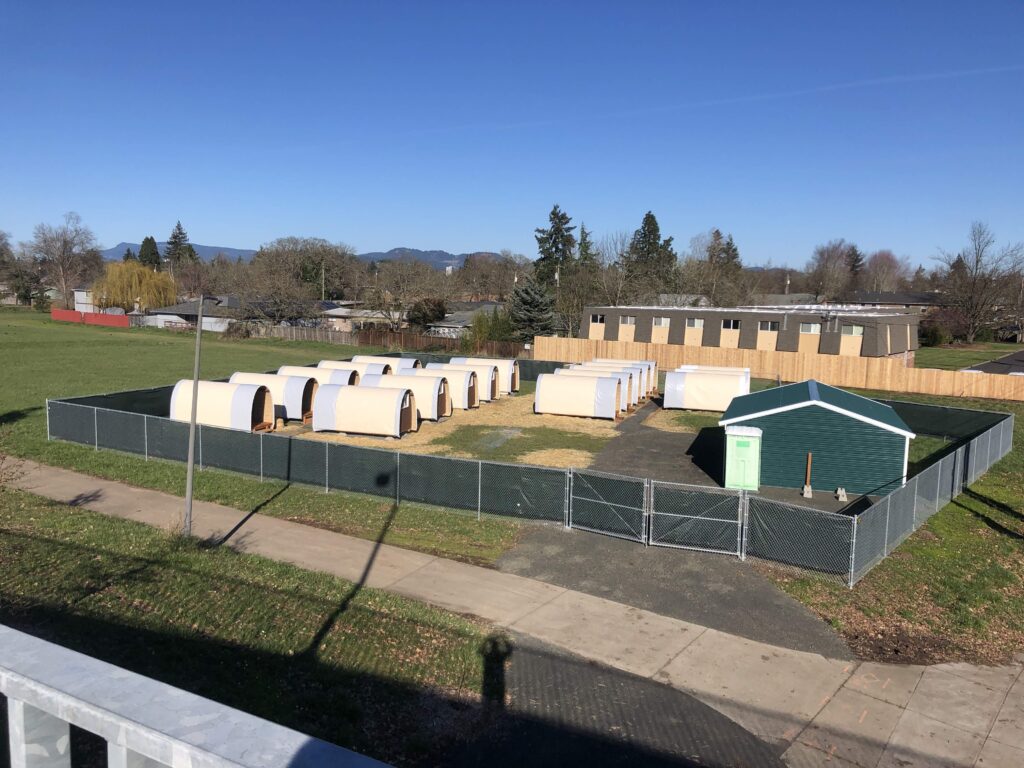
Check of the CSS Facebook video pages for testimonials from residents as well as nearby landowners and neighbors.

Rest Stop Facts
EPD Report on Proximate impacts of a Rest Stop.


Mircosites
A microsite is a location that provides transitional shelter to a small group of individuals who are currently experiencing homelessness. Up to six Conestoga huts or tents are allowed via City Code 4.816. The site is managed by a nonprofit social service provider who is responsible for maintaining the site, providing supervision and oversight, and supporting the residents.
Lane Event Center Microsite [2021]
Sarai Johnson, the first-ever Lane County and city of Eugene joint housing and shelter strategist, and someone who the JWN has worked with before, contacted the JWN in January 2021 with a proposal to place a microsite “pods” at Lane Events Center. Of particular interest are locations that improve security around the Jefferson EWEB Substation.
Lane County is developing a microsite with six structures on the south side of the Lane Events Center, just south of Amazon Canal. This simple, managed, private setup provides a temporary home for people who otherwise have no choice but to live outside.
The microsite will consist of six Pallet Shelters, portable toilets, a handwashing station, and trash service all contained within a privacy fence. The space and surrounding area will be kept neat and free of debris.
The site will be managed by an experienced nonprofit who will support the camp with basic needs, supervision, and case management. People who stay in the microsite will have clear expectations and limitations. No unsanctioned camping will be allowed near the microsite, and guests will be accountable for maintaining their space and preventing the kind of unwanted activities and challenges the neighbors already experience, such as drug use and paraphernalia, trespass, loitering, and waste and debris. An EPD analysis based on calls for service showed a 36% reduction in calls for assistance within the first year of operation when a microsite and Rest Stop opened in 2014. In 2015, the calls reduced another 9%, and since that time, calls for assistance have remained consistent at the full 45% reduction. This indicates that the way microsites and rest stops are set up and operated in fact make the neighborhood safer.
This microsite will start as a COVID-19 response, which is why the site is moving forward rapidly. This site will stand from the time the infrastructure is completed and a service provider is in place until June 30, 2021. The County plans to use the site as a seasonal shelter from November to March annually. Before the next winter season, more in-depth outreach and conversation will be facilitated with neighbors.
Lane Events Center Conestoga Hut Pilot [Fall 2019]
The JWN Executive Board unanimously approved the pilot project to house 3 to 6 residents in the Conestoga huts at the Lane Events Center and Lane County Commissioners voted in favor. The Executive Board based its decision on the overwhelming support of neighbors, the record of Community Supported Shelters (CSS) managing these sites, evidence of their efficacy, and a record that demonstrates such a facility does not result in a rise in illegal activity proximate to the site. The Executive Board feels that this project will, in a small way, help address the challenges of homelessness without negatively impacting the neighborhood.
Process
177 neighbors participated in our online survey, with 85% in favor across the neighborhood and 60% in favor who live the area directly adjacent to the proposed site. Seven neighbors submitted emails, in which four were in favor of the project.
The survey came at the end of a public process that included mailed notification of all JWN addresses via the Summer Newsletter, notifications via our monthly eNews, several special eNews Editions, and postings on our social media and website. A public meeting on the project took place in September at the Lane Events Center and a discussion was held at the JWN October General Meeting. In addition, flyers were distributed in are areas directly adjacent to the proposed site notifying neighbors of the survey and providing a url.
Some neighbors expressed some specific concerns. While we cannot address each individual comment, we would make the following points:
- The pilot site is not a homeless camp and is limited to those in the Community Supported Shelters program. There will be no tents, just 3 very neat and self-contained Conestoga huts actively monitored by Community Supported Shelters (CSS), who provide sanitation and garbage collection.
- Residents are carefully selected and have at least 10 months successfully participating in the CSS program.
- CSS managed site have not resulted in a rise in crime or illegal camping proximate to these sites. In fact, the experience with Conestoga hut sites like this is a reduction in illegal activity.
- Three to six new people in the neighborhood will not constitute a parking problem, as they generally do not have cars.
- The proposed site is on the fairgrounds property and residents will have to abide by fairground management rules, which are quite strict.
- The Conestoga huts will be moved for 3 weeks around and during the annual county fair.
One neighbor has offered to do laundry for our new neighbors.
Status: before the project was initiated, Homes for Good (Lane County Housing Authority) secured grant funding to create permanent supportive housing on that site, the the plan was scrapped. See below for details on that project and other efforts to create supportive housing.
Homelessness: Supporting the Needs of the Unhoused
There are two bathrooms at Monroe Park that were designed to be open in good weather. As part of Park Bond Measure, the bathrooms were set to be open year around. After considerable pressure from the JWN this became a reality in the winter of 2019. However, the porous nature of the room meant only one could be open. Again, after a concerted campaign, the bathroom was modified so both bathrooms could be open for the winter of 2021.
Homelessness: Managing Impacts of Unsanctioned Camping
Unfortunately, un-managed camping in public spaces has been a source of trash, human waste, noise, and crime. The plight of the unhoused and the reasonable expectation of housed residents creates conflicts that are a challenge to manage. Historically, the city has seen neighborhoods such as Jefferson Westside and the Whitaker as places to allow this sort of activity to take place due to their proximity to downtown and the socioeconomic status of these formally neglected but now gentrifying neighborhoods. The JWN rejects the notion that tolerating unsanctioned sheltering, with it many problems, in neighborhoods is a viable solution. This notion has allowed local government to shirk its responsibilities to find places for people to live. The JWN strategy has been to move aggressively to force mitigation while advocating for sanctioned, safe, sanitary managed shelters. The idea that by denying the city the option, we can prod the city to action.
The negative impacts of unsanctioned camping can be rather extreme, as was witnessed during the unilateral suspension of the camping ban during the COVID lock-down in spring 2020. The impacts and the city and county’s gross failures to provide even the most basic security and sanitation are described in detail in Report on Impacts to the Jefferson Westside neighborhood by Lane County’s policy on Homeless Camping and the City of Eugene’s Actions during the COVID 19 Stay-at-Home Order.It makes for grim reading ans spurred the the more aggressive stance of the JWN on un-sanction camping in the neighborhood.
Where Can People Go? City of Eugene Homeless Services Immediate Policy Recommendations
A conversation borne from frustration for how the unhoused were managed during the COVID 19 crisis and the resulting neighborhood impacts between JWN Chair Ted M. Coopman, Heather Selicki Operations Coordinator at White Bird, and Laurie Hauber, Staff Attorney, Oregon Law Center/Lane County Legal Aid has resulted in a series of recommendations for mitigating some of the impacts of homelessness on neighborhoods as well as blunting the effects on homeless people of using police, with the resulting high costs, to enforce the camping ban. We feel that these are relatively minor adjustments that do not involve changes in ordinances, still regulates camping, and can set us on a path for a more serious effort on short term harm reduction. It also places agency and responsibility on the homeless themselves as well as starting a conversation on the best uses for sworn officers. Moreover, these recommendations can set the stage for future cooperation between service providers, neighborhoods, businesses, and the city and county on practical solutions. These recommendations were endorsed by dozens of service providers, faith groups, neighborhood associations, and citizens. While they were not formally enacted by the city, one major provision, to use non-police resources in responding to standard camping complaints, was adopted.
Permanent Supportive Housing
The Keystone: Permanent Supportive Housing at Lane Events Center
Homes for Good has completed the Keystone, a Permanent Supportive Housing complex at Lane Events Center (Tyler and 13th)
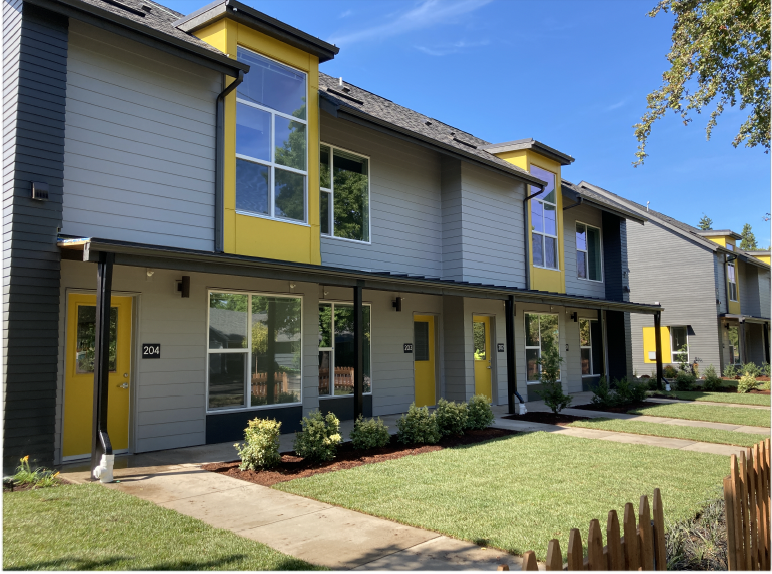
The Keystone, is a permanent supportive housing development built by Homes for Good (Lane County Housing Authority) at W.13th Ave. and Tyler St. in the JWN. The project developed through a community collaboration to identify, engage, house, and support families experiencing
homelessness in our community. Quantum Residential manages the property and ShelterCare is the service provider.
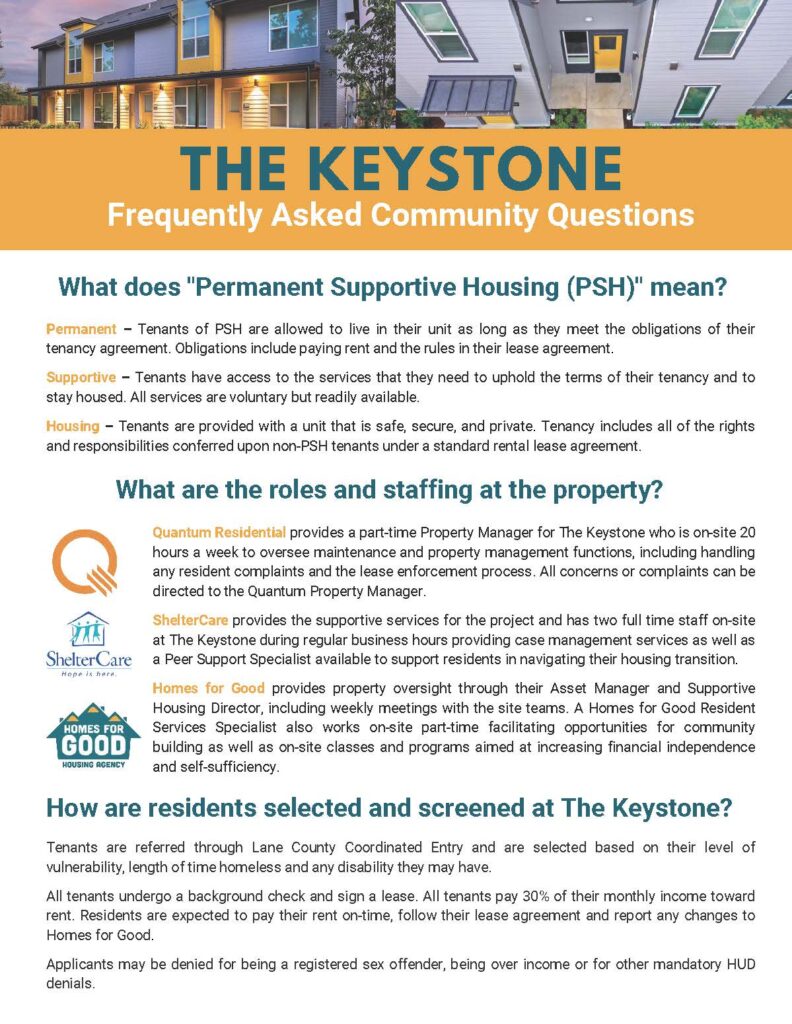
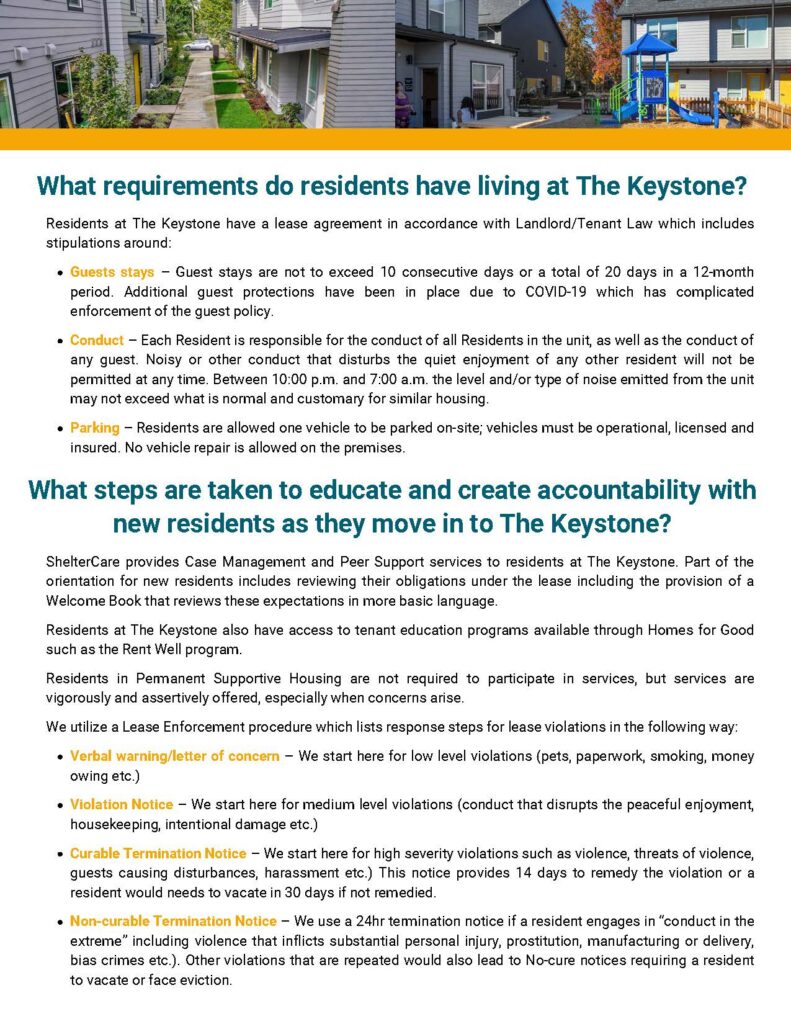
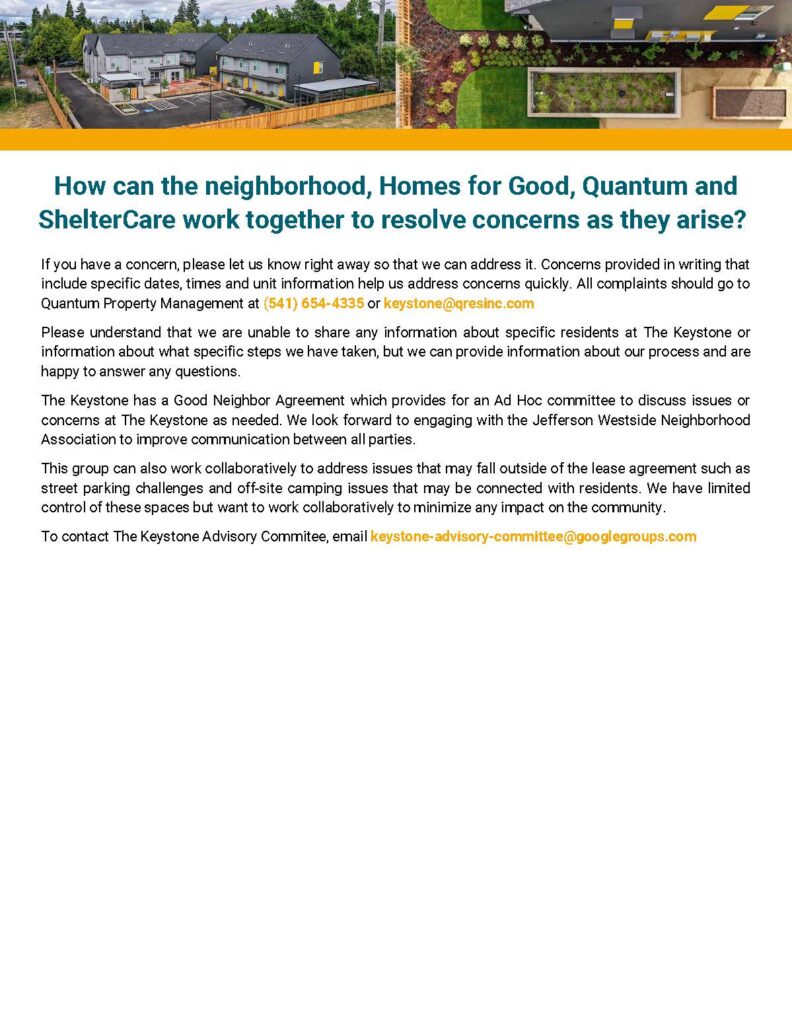
Keystone Development Process Archive
Latest Renderings for the Site (no colors chosen yet).




Updated March 17, 2020
Homes for Good (Lane County Housing Authority) is moving forward on the construction of a 16-unit permanent supportive housing (PSH) complex dedicated to single-parent families at the corner of 13th and Tyler on Lane Event Center property (where the Conestoga huts were approved). The expedited timeline was to take advantage of available time-sensitive grants.The JWN is working with Homes for Good on community outreach.
We have expressed concerns over preserving existing street trees and screening foliage, making sure there is guest parking, and possibly including street parking on 13th.
Stay tuned here for more information.
To make comments, suggestions, or ask questions, contact us. Please make sure to refer to plans by their letter designation.
 Current Site Conditions
Current Site Conditions
Here are some Examples of Existing Facilities
Please note that the proposed project will be two story, these are to get stylistic idea of the architects work. Also, keep in mind that the zoning rules at the the 13th and Tyler location are also different.

Proposed Site Draft Site Plan Options
These are different configurations for city of Eugene review.





